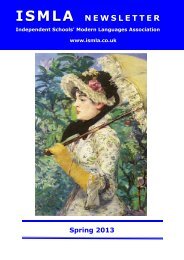Summer 2013 - The Independent Schools' Modern Language ...
Summer 2013 - The Independent Schools' Modern Language ...
Summer 2013 - The Independent Schools' Modern Language ...
Create successful ePaper yourself
Turn your PDF publications into a flip-book with our unique Google optimized e-Paper software.
a normal class”. <strong>The</strong> only downside has been when the headsets don’t work<br />
properly and time is wasted, but I’ve been told that headsets that plug in<br />
with a USB connection are much better, so I’ll be investing in some of those<br />
soon.<br />
Despite the fact that the primary aim was not to improve their language, but<br />
to reduce their anxiety - which was a barrier to learning - some initially questioned<br />
how much they would learn if they couldn’t correct each other. Research<br />
suggests that when non-native speakers (NNS) are put together, they<br />
work harder to negotiate meaning, making it a “good forum for obtaining<br />
input necessary for acquisition” (2). On the other hand, a native speaker<br />
(NS) or expert may use a variety of strategies to keep a conversation going,<br />
such as using simplified language, ignoring mistakes and tolerating irrelevant<br />
answers, thereby reducing the authenticity of their input (3). In such dialogues,<br />
a NNS will always be in the inferior position, and may pretend to understand<br />
to avoid embarrassment, whereas with another NNS, they recognize<br />
their “shared incompetence” and are less intimidated. After sharing this research<br />
with the girls, I found they became increasingly proactive in Skype<br />
sessions and increasingly articulate in how they evaluated its usefulness,<br />
saying things like “it takes the pressure off because if you make a mistake<br />
it's not embarrassing as the other person also makes mistakes”, and “I felt I<br />
could correct and help the other person”.<br />
Although the idea is not a million miles away from the old language lab pairing<br />
function, such software is precisely for use in a language-lab, whereas<br />
Skype is an everyday communication tool with obvious real-life relevance,<br />
and using webcams greatly increases the fun factor. <strong>The</strong>y are also encouraged<br />
to multitask by having various windows open at once (an online dictionary,<br />
a word doc to take notes) which suits they way they are accustomed to<br />
working with computers, while wearing headphones makes them focus more<br />
and not get distracted by what is going on around them.<br />
Skype is increasingly being used in MFL classrooms and while the next step<br />
would be to establish authentic on-line exchanges with students in Spain or<br />
perhaps learners of Spanish in other countries, for now, it is proving to be a<br />
successfully student-centered, ICT-based approach to oral work that builds<br />
confidence and encourages girls to be more collaborative and reflective in<br />
their learning. As one girl simply put it, “the point is to spend more of the<br />
lesson orally participating without all eyes on you.”<br />
Helena Matthews <strong>The</strong> Godolphin & Latymer School<br />
(2) Varonis, Evangeline Marlos, and Gass, Susan, Non-native/Non-native Conversations: A Model<br />
for Negotiation of Meaning (1983: Applied Linguistics, Vol. 6, No. 1)<br />
(3) Long, Michael, H. Native speaker / non-native speaker conversation and the negotiation of<br />
comprehensible input (1982: Applied Linguistics, Vol. 4, No. 2)<br />
20



